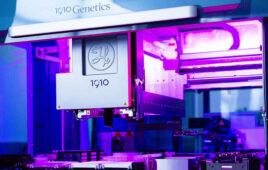 Lonza (LON:0QNO) and South Korea-based ABL Bio (KOSDAQ:298380) have joined forces to accelerate bispecific antibody development for immuno-oncology and neurodegenerative diseases. Over email, Basel, Switzerland–headquartered Lonza noted that its experience with novel molecular formats enables the company to handle ABL Bio’s unique challenges.
Lonza (LON:0QNO) and South Korea-based ABL Bio (KOSDAQ:298380) have joined forces to accelerate bispecific antibody development for immuno-oncology and neurodegenerative diseases. Over email, Basel, Switzerland–headquartered Lonza noted that its experience with novel molecular formats enables the company to handle ABL Bio’s unique challenges.
In the partnership, Lonza will provide submission-ready chemistry, manufacturing and controls (CMC) data for investigational new drugs (INDs), explained Andrew Brown, Lonza’s head of global process development support. “Leveraging more than three decades of expertise and innovative technologies, we provide an integrated drug substance and drug product program,” Brown said. “Thanks to our experience with new
molecular formats, we know how to handle [ABL Bio’s] specific challenges.”
In the domain of bispecific antibody development, Lonza supports customers with problem-solving aiming to get product candidates into the clinic and reach funding milestones on time, Brown added.
DNA-to-IND program for bispecific antibody development
The collaboration with ABL Bio aims to streamline the wider product development program. It delivers key CMC milestones, including generation of material for non-clinical toxicological studies. It also provides data to describe the expression vector, cell line, process, and product characteristics. Lonza‘s DNA-to-IND program for bispecific antibodies focuses on proactively identifying and mitigating technical risks at all stages of the process, leveraging their experience in developing and manufacturing biotherapeutics for hundreds of companies.
One challenge in bsAbs expression and manufacture is the incorrect pairing of heavy-chain (HC) and light-chain (LC) combinations, as well as the inability of many cell lines to efficiently express large DNA/vector constructs. Lonza addresses these challenges by using the GS Xceed system in combination with the GS piggyBac transposon system, along with tailored media and feeds, to optimize cell growth, viability, and protein production.
Clone selection and process optimization
Once the clones are growing well and producing the therapeutic protein, Lonza uses stable pools for early process optimization. Simultaneously, they perform high-throughput clone selection with technologies like the Beacon Optifluidic system. They use their platform and toolbox analytical methods to select clones that express the highest titer while delivering the required product quality attributes. The combination of the host cell line, vector, and selection stringency enables Lonza to offer high-producing cell lines that fit commercially relevant processes.
BsAbs with incorrect pairing may exhibit physicochemical properties similar to those of the desired target bispecific antibody. Downstream processing requires specialist knowledge to develop the right purification steps, while analytical methods need to be extremely sensitive to accurately detect incorrectly paired bsAbs and other unwanted impurities. Lonza continues to de-risk the process during downstream purification by using the best combination of platform and toolbox approaches to develop a scalable and robust process.
Lonza saves time by using cutting-edge technologies and integrating platform and toolbox approaches. Additionally, running parallel process and formulation development activities allows them to deliver Good Manufacturing Practice (GMP) quality drug substance to industry-leading timelines.
GS Xceed system and cell line development
The GS Xceed gene expression system is a reliable, scalable, and robust technology for producing biologics. It is used to develop not only monoclonal antibodies but also various next-generation molecules. These include bispecific antibodies, Fc-fusion proteins, enzymes, and hormones. The GS Xceed CHOK1SV GS-KO cell line achieves high average product titers of 4-5g/L, which can be further improved with process optimization.
The collaboration between Lonza and ABL Bio will provide ABL Bio with expertise and experience in novel molecular formats, access to state-of-the-art technologies, and flexibility and speed on the path to the clinic and commercialization. This partnership aims to bring innovative therapeutic antibody candidates one step closer to patients, impacting the future of immuno-oncology and neurodegenerative disease treatment.
Filed Under: Biologics, Cell & gene therapy, Drug Discovery and Development, Immunology, Neurological Disease, Oncology





Tell Us What You Think!
You must be logged in to post a comment.